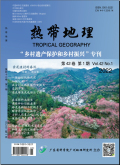热带地理2024,Vol.44Issue(10):1800-1811,12.DOI:10.13284/j.cnki.rddl.20230659
传统村落居民非遗日常生活实践中情感交换模式演变过程及机制——以皇都村侗族大歌为例
Evolution Process and Mechanism of Traditional Village Residents'Emotional Exchange Mode in the Daily Life Practice of Intangible Cultural Heritage:A Case Study of Huangdu Kam Grand Choirs
摘要
Abstract
In the context of globalization,the reconstruction of material spaces and the evolution of social relations have accelerated the loss of emotions in traditional villages.Intangible heritage can play an important role in the emotional maintenance of traditional villages as an emotional carrier for its residents.Previous studies have been less involved in the synergistic relationship between the interactive game of power subjects and the evolution of emotions in the practice of intangible heritage.Particularly,research on the evolution of the emotional exchange mode is insufficient.Taking the Dong minority chorus of Huangdu Village as an example,this study adopts qualitative research methods,such as semi-structured interviews and participant observation,to construct an analytical framework of"daily life practice-emotional exchange",and to deeply explore the evolution process and motivational mechanism of the emotional exchange mode in the daily life practice of traditional village residents.The study found that:1)According to the changes in the subject and relationship,motive and mode,resource and situation,perception and experience of emotional exchange in the natural,livelihood,institutional,and spiritual dimensions,the daily life practice of Huangdu Village can be divided into four stages:primitive equilibrium,passive compromising,active resisting,and regenerating.2)In the process of intangible cultural heritage practices,the manipulation of capital and the suppression of power have broken the original balance of Huangdu Village,and the division of power and status among subjects has squeezed the living spaces of local residents,forcing them to become involved in power struggles.They resist the control of the"other"by means of physical empowerment and restatement of the local subjectivity,and ultimately strike a balance of power within the village.In the daily practice of intangible cultural heritage,the mode of residents'emotional exchange changes from reciprocity to general negotiation and production modes.3)Emotional exchanges in traditional villages are produced during power struggles between residents and other subjects.When power is balanced,residents master the discourse of intangible cultural heritage and produce positive emotions such as attachment and belonging.When residents are suppressed by power and capital,they gradually lose discourse and produce negative emotions,such as a sense of crisis and separation.4)The evolution of emotional exchange modes in the daily practices of traditional village residents is systematic.The evolution of the outer system pushes the kernel system to adapt,and the driving,pulling,and supporting forces promote the synergistic evolution of"daily life―emotional exchange―intangible cultural heritage practice"in Huangdu village.The evolution of emotional exchange patterns during the practice of the Dong minority chorus in Huangdu Village was an inevitable process for reconstructing the cultural subjectivity of local residents in the context of tourism development.Exploring emotional exchange patterns at different stages of daily life practices can help understand the developmental law of traditional villages and provide useful references for its emotional governance and sustainable development.关键词
日常生活实践/情感交换模式/演变/传统村落/非遗/皇都村侗族大歌Key words
practice of everyday life/emotional exchange mode/evolution/ancient village/intangible cultural heritage/Huangdu Kam Grand Choirs分类
社会科学引用本文复制引用
杨立国,王佳琴,刘旭..传统村落居民非遗日常生活实践中情感交换模式演变过程及机制——以皇都村侗族大歌为例[J].热带地理,2024,44(10):1800-1811,12.基金项目
国家自然科学基金(42471277) (42471277)
湖南省社会科学基金(22YBA192) (22YBA192)
湖南省研究生科研创新项目(CX20221265) (CX20221265)

